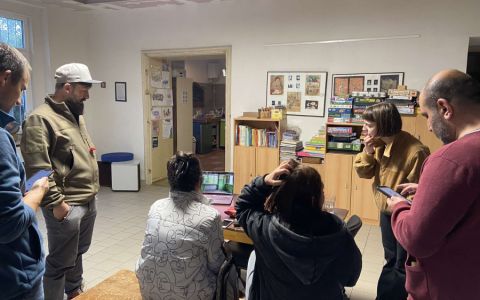On April 17 and 18, three Brest activists - Dmitry Bekalyuk, Alexander Kabanov and Dmitry Androsyuk - were detained before the “feeding of pigeons” - a weekly Sunday protest against a battery factory carried out by the citizens of Brest. The activists were allegedly detained so that they couldn't participate in the protest on April 19, 2020.
On April 20, the Leninsky District Court of Brest sentenced Dmitry Androsyuk and Alexander Kabanov to 15 days of administrative arrest for participating in an unsanctioned protest on April 12. Dmitry Bekalyuk was also sentenced to 15 days of administrative arrest two days later.
The three men were participating in weekly peaceful protests against the "iPower" battery plant in Brest, the construction of which began in 2017 in the Brest free economic zone. Since the beginning, there have been issues with the project. For example, the public was not involved in the discussion of the possibility of building a battery plant at an early stage. Moreover, adequate information was not provided when making changes to the project and adjusting the EIA report. The public opinion wasn't taken into account in the decision making. This significantly reduced the degree of people’s trust in local authorities that resulted in spontaneous meetings on the Lenin square in Brest on Sundays.
Since February 25, 2018, “feeding the pigeons” takes place every Sunday on Lenin Square in Brest - a peaceful protest, during which the Brest residents gather, communicate, exchange news about the battery plant and thus silently and peacefully protest its construction. Over the period of these gatherings, many Brest citizens have been detained or fined, and they were charged with violating the established procedure for holding a mass event.
People have been trying to find a legal and official way to express their opinion: Over the entire period of the protests, a great number of applications were submitted in Brest and the Brest region, namely for 325 rallies, 18 pickets and 16 demonstrations. The authorities allowed only one of them: the rally “Brest Women Against Lead” on April 29, 2018, which was attended by about two thousand people. The main bases for the refusal are: “at the stated time another event has already been planned at the indicated site” or “repair work is being carried out at the declared place”. However, there is no list of previously planned events publicly available. Also, there is no public access to information on repair work at sites intended for mass meetings, and city authorities don't allocate another place or date, thus preventing the citizens from officially and legally exercise their rights.
Belarus is a party to the Aarhus Convention, which doesn't allow for prosecution of activists who exercise their environmental rights. However, a report issued by the Aarhus Compliance Committee on March 9, 2020, noted that "persons seeking to exercise their rights under the Convention in the Party concerned remain at risk of penalization, persecution or harassment for doing so."
Despite the arrest of Androsyuk, Kabanov and Bekalyuk, the citizens of Brest continue the weekly Sunday protests against the battery plant. "People are not satisfied with the factory and went to the square to make it clear to the authorities that the battery factory does not belong here,” said human rights activist Uladzimir Vyalichkin.







